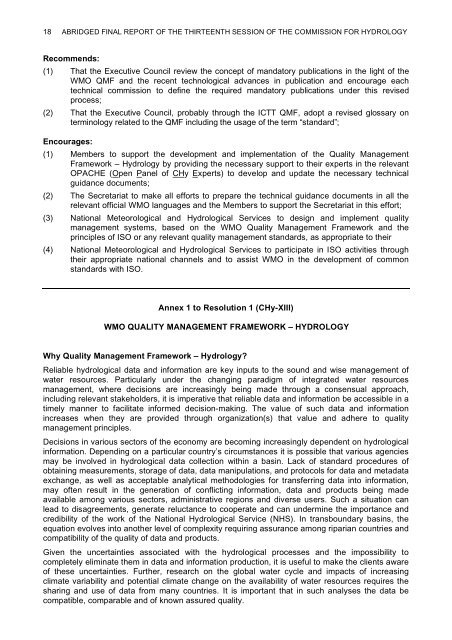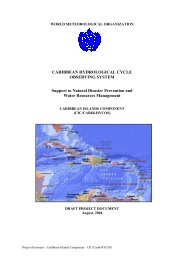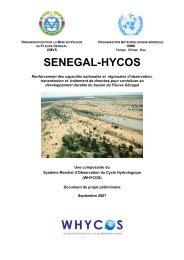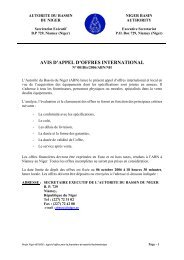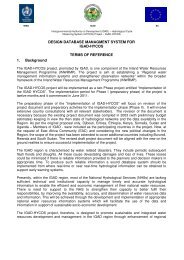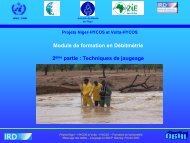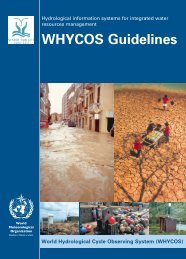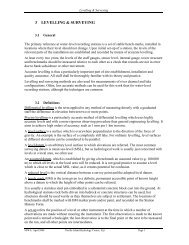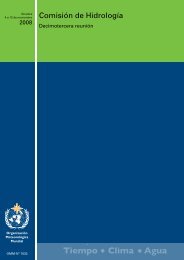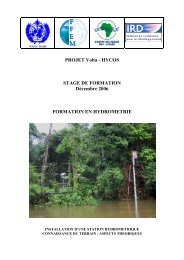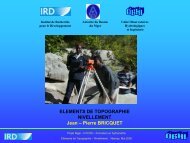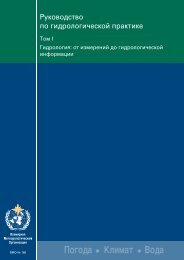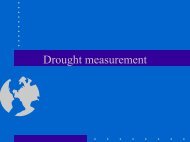Part I - FTP Directory Listing - WMO
Part I - FTP Directory Listing - WMO
Part I - FTP Directory Listing - WMO
You also want an ePaper? Increase the reach of your titles
YUMPU automatically turns print PDFs into web optimized ePapers that Google loves.
18 ABRIDGED FINAL REPORT OF THE THIRTEENTH SESSION OF THE COMMISSION FOR HYDROLOGYRecommends:(1) That the Executive Council review the concept of mandatory publications in the light of the<strong>WMO</strong> QMF and the recent technological advances in publication and encourage eachtechnical commission to define the required mandatory publications under this revisedprocess;(2) That the Executive Council, probably through the ICTT QMF, adopt a revised glossary onterminology related to the QMF including the usage of the term “standard”;Encourages:(1) Members to support the development and implementation of the Quality ManagementFramework – Hydrology by providing the necessary support to their experts in the relevantOPACHE (Open Panel of CHy Experts) to develop and update the necessary technicalguidance documents;(2) The Secretariat to make all efforts to prepare the technical guidance documents in all therelevant official <strong>WMO</strong> languages and the Members to support the Secretariat in this effort;(3) National Meteorological and Hydrological Services to design and implement qualitymanagement systems, based on the <strong>WMO</strong> Quality Management Framework and theprinciples of ISO or any relevant quality management standards, as appropriate to their(4) National Meteorological and Hydrological Services to participate in ISO activities throughtheir appropriate national channels and to assist <strong>WMO</strong> in the development of commonstandards with ISO.Annex 1 to Resolution 1 (CHy-XIII)<strong>WMO</strong> QUALITY MANAGEMENT FRAMEWORK – HYDROLOGYWhy Quality Management Framework – Hydrology?Reliable hydrological data and information are key inputs to the sound and wise management ofwater resources. <strong>Part</strong>icularly under the changing paradigm of integrated water resourcesmanagement, where decisions are increasingly being made through a consensual approach,including relevant stakeholders, it is imperative that reliable data and information be accessible in atimely manner to facilitate informed decision-making. The value of such data and informationincreases when they are provided through organization(s) that value and adhere to qualitymanagement principles.Decisions in various sectors of the economy are becoming increasingly dependent on hydrologicalinformation. Depending on a particular country’s circumstances it is possible that various agenciesmay be involved in hydrological data collection within a basin. Lack of standard procedures ofobtaining measurements, storage of data, data manipulations, and protocols for data and metadataexchange, as well as acceptable analytical methodologies for transferring data into information,may often result in the generation of conflicting information, data and products being madeavailable among various sectors, administrative regions and diverse users. Such a situation canlead to disagreements, generate reluctance to cooperate and can undermine the importance andcredibility of the work of the National Hydrological Service (NHS). In transboundary basins, theequation evolves into another level of complexity requiring assurance among riparian countries andcompatibility of the quality of data and products.Given the uncertainties associated with the hydrological processes and the impossibility tocompletely eliminate them in data and information production, it is useful to make the clients awareof these uncertainties. Further, research on the global water cycle and impacts of increasingclimate variability and potential climate change on the availability of water resources requires thesharing and use of data from many countries. It is important that in such analyses the data becompatible, comparable and of known assured quality.


